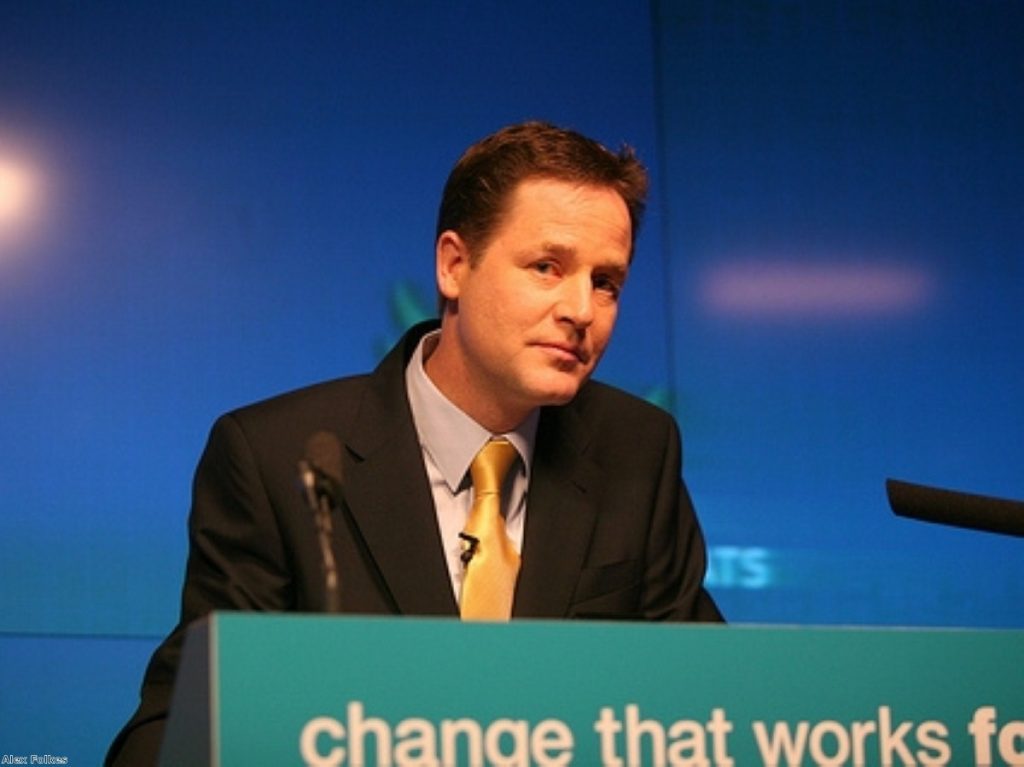It begins: Clegg backs plan to devolve power to English cities
The prospect of far-reaching changes to Britain's constitutional arrangements loomed closer today, after the deputy prime minister lent his support to a plan to devolve power in England.
Analysts predicted that the granting of new powers to Scotland would trigger demands for similar moves in England and Wales.
There is also a growing recognition that the intense anti-Westminster feeling motivating the 'Yes' camp is replicated across the UK and needs to be addressed.
Nick Clegg will launch a report by IPPR North calling for metropolitan local authorities to be combined and headed by an elected 'metro mayor'.


"Whichever way Scotland votes next week, Edinburgh will get new powers and widen the gap with local leaders across England," IPPR North director Ed Cox said.
"England has waited patiently while Scotland, Wales and Northern Ireland have been given ever greater devolution. Now is the time to redress the balance and devolve powers to English city-regions."
The report calls for the new, bigger local authorities to be given tax-raising and spending powers alongside 40 other government functions.
Council tax bills – including the power to introduce new bands – would be granted as well as full control over business rates.
Property tax could also be decentralised, while ten per cent of income tax from within an area would be kept for spending in that area.
The move is the first sign of how deep and wide-ranging the constitutional changes coming to the UK could be even in the event of a 'No' vote next week.
The emotional shock of seeing 'Yes' take the lead on Sunday has had a shattering effect on the political class and there is a growing consensus that extensive decentralisation of power from Westminster is the way to deal with the growing national alienation from London's political base.
A core cities conference will also see the leaders of some of England's biggest councils call for greater regional devolution of power to a group of special 'core cities'.
Poll blow for Salmond
The report comes amid further blows to Alex Salmond, as he tried to regain the initiative he enjoyed at the start of the week despite a succession of negative news stories.
Last night's YouGov poll for the Times and the Sun put the 'No' camp back ahead, on 52% to the 'Yes' camp's 48%. Undecided voters now number only four per cent.
The onslaught of warnings from businesses and banks continued, with the bosses of BT, B&Q and Marks and Spencer set to warn of the risks of separation.
Mike Rake, chairman of BT Group, told the Financial Times: "The uncertainty will last for easily ten years. Inevitably this uncertainty will lead to a slowdown in investment in the UK as a whole as well as Scotland."
Marc Bolland, chief executive of M&S, is expected to sign a joint letter with other leading stores warning of rising prices in the event of independence.
Alex Salmond said the 'No' camp was organising a campaign of scaremongering from businesses, but banks, five of whom are moving their headquarters south of the border in the event of a 'Yes' vote, said they were responding to market and customer demands.
Bank exodus

The Royal Bank of Scotland, which employs over 35,000 people, led the way, with Lloyds, Clydesdale, TBS and Tesco Bank following.
They believe they will be penalised by investors and ratings agencies if they stay domiciled in a country without the Bank of England as a lender of last resort. They have also been made nervous by an increase in inquiries from jittery customers.
Salmond said the Treasury had deliberately leaked the RBS information, which was market sensitive, during a dramatic press conference yesterday.
When asked a separate question by the BBC's Nick Robinson, Salmond threatened him by saying he expected the corporation to "cooperate" in an inquiry into the matter.
But Cabinet secretary Jeremy Heywood wrote to Salmond angrily rejecting the idea Treasury officials leaked the information, saying it had "confirmed its understanding of RBS’s contingency planning [to] maintain financial stability".
BBC
Meanwhile, reports emerged of a BBC internal study which found Scottish viewers would need to pay twice what they currently do on the licence fee to keep watching its broadcasts.
The unpublished report found the total amount paid into the BBC from Scottish viewers was substantially lower than the services they receive and that the licence fee would probably have to rise to around £300 from the current £145.50 in the event of independence.











